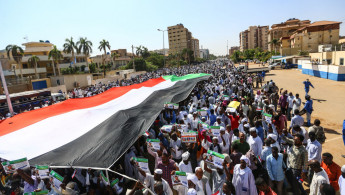Sudan coup: Police fire tear gas at defiant protesters demanding end to military rule
Security forces fired tear gas on Sunday as thousands of demonstrators took to the streets of the Sudanese capital demanding a return to civilian rule, AFP correspondents said.
Raising Sudanese flags and posters of activists killed during pro-democracy protests, protesters tried to march on the presidential palace in central Khartoum as security forces used tear gas to disperse them.
Others chanted against military rule and erected barricades in North Khartoum and Omdurman, an AFP correspondent said.
Tear gas was also fired in the capital's twin city of Omdurman and in North Khartoum, where protesters tried to cross the bridge leading to the centre of the capital.
In the eastern city of Kassala, some "800 young men and women" came out to demand civilian rule, eyewitness Hussein Mohamed Shahed told AFP.
Protesters chanted, "soldiers go back to the barracks", a regular rallying cry in near-weekly protests since last year's coup toppled civilian leaders.
On October 25, 2021, army chief Abdel Fattah al-Burhan seized power, arresting civilian leaders and derailing a transition to civilian rule that had started with the 2019 ouster of long-time autocrat Omar al-Bashir.
Protests were reignited last week on the first anniversary of the power grab, when thousands marched across Sudan, demanding an end to the political and economic crisis that has gripped the country.
Security forces fired tear gas at Khartoum marches, and one protester was killed when he was crushed by a military vehicle in Omdurman, according to pro-democracy medics.
According to the medics' tally, 119 people have been killed while protesting against military rule over the past year.
The coup exacerbated a wider security breakdown that has left hundreds more dead, while the country, already one of the world's poorest, battles three-digit inflation and chronic food shortages.





 Follow the Middle East's top stories in English at The New Arab on Google News
Follow the Middle East's top stories in English at The New Arab on Google News

![MP Essam Diab's pursuit to block TikTok in Egypt has revived an already ongoing debate in the country. [Getty]](/sites/default/files/styles/image_330x185/public/1230748046.jpeg?h=a5f2f23a&itok=-8MqBLLC)
